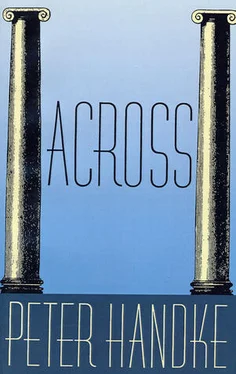Peter Handke - Across
Здесь есть возможность читать онлайн «Peter Handke - Across» весь текст электронной книги совершенно бесплатно (целиком полную версию без сокращений). В некоторых случаях можно слушать аудио, скачать через торрент в формате fb2 и присутствует краткое содержание. Год выпуска: 2000, Издательство: Farrar, Straus and Giroux, Жанр: Современная проза, на английском языке. Описание произведения, (предисловие) а так же отзывы посетителей доступны на портале библиотеки ЛибКат.
- Название:Across
- Автор:
- Издательство:Farrar, Straus and Giroux
- Жанр:
- Год:2000
- ISBN:нет данных
- Рейтинг книги:3 / 5. Голосов: 1
-
Избранное:Добавить в избранное
- Отзывы:
-
Ваша оценка:
- 60
- 1
- 2
- 3
- 4
- 5
Across: краткое содержание, описание и аннотация
Предлагаем к чтению аннотацию, описание, краткое содержание или предисловие (зависит от того, что написал сам автор книги «Across»). Если вы не нашли необходимую информацию о книге — напишите в комментариях, мы постараемся отыскать её.
Across — читать онлайн бесплатно полную книгу (весь текст) целиком
Ниже представлен текст книги, разбитый по страницам. Система сохранения места последней прочитанной страницы, позволяет с удобством читать онлайн бесплатно книгу «Across», без необходимости каждый раз заново искать на чём Вы остановились. Поставьте закладку, и сможете в любой момент перейти на страницу, на которой закончили чтение.
Интервал:
Закладка:
What stops me from going back to the school when my paper is finished? Don’t I need my daily work, or at least my presence there, the comfort of habitual turns of phrase? Hasn’t my place always been in an interlocking collective, each member of which, however, keeps his distance from the others? Doesn’t the public sphere, without which I am incomplete, begin at the school door? Isn’t my ride to my public existence the natural thing for me, and doesn’t it open up the possibility of a satisfactory way back? In any event, I don’t regard myself as a loner, it doesn’t suit me to be a freelancer, and certainly not an independent scholar (though, early in my studies, someone advised me to become one). I know I should work with others, not just occasionally, but day after day. Only among others does something resembling a world appear to me, if only in the briefly flaring brown of a lichen in the Antarctic. One day perhaps a stranger from the plains, on his way to a still-undiscovered city, will approach our local castle (that forbidding hulk), and the canal at his feet will flow through timeless lowlands, or through the Chinese limestone province of Kwei-lin. Did I, for that, need a kind, my kind, of job? But now will I have another few days to myself? Won’t it soon be Easter vacation, in any case?
I opened both my workroom windows and let the sounds in. From the north, not far away, came the ringing of the bells at Gneis, which is already within the city limits; from the west, almost as audible because of the wind, the bells of the Moos church, which was much farther away. The manager of the store downstairs was moving boxes and chalked signs back inside. A train in the distance didn’t whistle, but gave out a sound as of someone blowing into his cupped hands — a brewery locomotive on the way back to its shed for the night. High over the foothills of the Bavarian Alps, the plane from Zurich came into view with a violent blinking of lights; the runway was brightly lit to receive it; the plane went into a slow glide and its landing lights flared up; a few seconds after it put down, the din filled the whole plain.
Now I had time. Facts and questions crystallized. This having-time wasn’t a feeling; it was a resolution: the resolution of all my contradictory feelings. It was a jolt and a widening; disengagement and devotion; defenselessness and the ability to resist; quiescence and enterprise. Its occurrence was rare. Perhaps what is commonly called a “state of grace” should be called a “state of having time.” It had its counterpart in a traditional paraphrase of the threshold concept as a “transition between privation and riches.” In a state of having-time, a murmur spread over the countryside, colors shone, grasses trembled, moss cushions puffed up.
Holding my plate on my lap, I ate in the kitchen, which was too small for a table. A colony of daddy longlegs adhered to the walls, clinging to the grainy limestone with their spindly legs, which suggested clock hands. Unceasingly, they swung to and fro, giving the whole kitchen the air of a clockmaker’s workshop, filled with pendulums and silent ticking. From time to time the clocks shifted their position, or else one would stand long-legged over another, the two of them swinging together. Down on the tile floor, several of the evidently short-lived creatures lay on their backs, radial forms no longer — some with legs folded in dying, but quivering violently; others, already dead, had twined their legs tightly around their already dried-out bodies: mummylike balls, visibly gathering dust. The gaps left by the fallen were immediately taken by others, evidently newborn, brighter in color than the rest and conspicuously smaller, which joined at once in the general ticking. These creatures are known to me from excavation sites, where they often keep those working in the galleries company with their pendular motion. Here in my place they serve as household pets, as does the unidentified insect inside the ball of sand on my desk; by making me look up and pause in my work, they, like sundials, help me to “have time.” If it was possible in the past to worship (or at least to see) the sun in beetles, why not in these harmless spiders that spin no webs? These are animals which, even when they appear in large numbers, provoke no fear, but only surprise and amusement. “Daddy longlegs, patron of threshold seekers,” I said in the night-dark kitchen to the hum of the fluorescent lamp, to the ticking of the real clock (on the electric stove), to the clicking of the trolleys on a bus that was just pulling out from the turnaround down below.
And then the ticking and swinging of the daddy longlegs tied in with the poem, from which, as usual at the end of the day, I slowly, word by word, read a few lines — Virgil’s poetic treatise on agriculture, known as The Georgics (I hope to translate it when I’m old and retired from other work): the lines from The Georgics turn time back for me, or give it a different meaning.
The express purpose of the work, as stated at the beginning, is instruction: about the dates for plowing, binding the vines, and so on, about cattle raising and agriculture; at the same time, it is conceived as a poem. This poem can indeed teach us a great deal about the laws of nature, and its teaching cannot grow old. For instance, a vine outside our house in Gois was languishing until in The Georgics I came across a line I had disregarded up until then, to the effect that “grain” demands “firm soil,” whereas the vine requires “loose soil.” And our worry about the bay tree in the garden whose leaves fell at the slightest midsummer breeze was dispelled by Virgil’s casual remark about the pomegranate tree, which according to him resembles the bay, except that it smells different and that “no wind can tear off its reeling leaves” (suggesting that such loss of leaves was characteristic of the bay tree and not a symptom of disease).
However, it is not from these agricultural precepts that I derive the lesson I really care about, but from the poet’s enthusiasm (never uncontrolled) for the things that still matter: the sun, the earth, rivers, woods, trees and shrubs, domestic animals, fruits (along with jars and baskets), utensils and tools. In these objects, justice, before vanishing from the world, left its trace; thus, far from the weapons that divide man from man (the usual word for “weapon” stands here for peaceable implements), every single thing in the poem, removed once and for all from history, distanced from other things and at the same time held in free association with them, gives me access to a very different story — usually invoked with an epithet: the slow-growing olive tree, the smooth linden, the bright-colored maple, the loose marl, the savage east wind, the air-clearing north wind, the dew-giving moon. Similarly, a box hedge, trimmed round or square in accordance with present-day tastes, conceals (or preserves) within itself the “swaying box tree,” which I am able to reconstruct on the basis of the epithet that does justice to the thing. Virgil, it is said, created his verses in the manner of a she-bear bringing forth her cubs, by hard labor during birth and even greater labor in “licking them clean,” so as to give his progeny its existential form. And since poetry should above all be congruent with things, these verses never cease to revive for me, the reader, the existence of the things they sing of. Goats with their heavy udders — are they not “struggling across the threshold” at this very moment? Are not cows once again “obliterating their tracks with their tails as they make their way” over some country road? As I looked up, a car from somewhere turned onto the canal bridge and, thanks to Virgil’s verses, gleamed a special blue.
The circle of lamplight on my desk; the bicycle stand down at the bus stop (replacing the pyramid of the Staufen, which had vanished in the darkness); the driver sitting in the waiting bus; the dog lying in the garden of the house next door; the stacks of shopping bags in the supermarket; the birds roosting in the bushes; the dangling creepers on the Salzach meadows; the emptiness of the long wooden bench in front of a farmhouse; the crisscrossing paths on the plain; the crookedness of the quarter moon (in place of the blinking airplane that was there before); the green spirals in the vegetable gardens; the sinkholes in the Untersberg karst (an inverted pyramid); the slow rotation of the disk in the electric meter; the falling dew; the gravel banks deposited on alluvial cones; the body lying in state; the winged ram.
Читать дальшеИнтервал:
Закладка:
Похожие книги на «Across»
Представляем Вашему вниманию похожие книги на «Across» списком для выбора. Мы отобрали схожую по названию и смыслу литературу в надежде предоставить читателям больше вариантов отыскать новые, интересные, ещё непрочитанные произведения.
Обсуждение, отзывы о книге «Across» и просто собственные мнения читателей. Оставьте ваши комментарии, напишите, что Вы думаете о произведении, его смысле или главных героях. Укажите что конкретно понравилось, а что нет, и почему Вы так считаете.












